Editor’s note: Election Day is Tuesday, Nov. 5. Stay informed with OPB on the presidential race, key congressional battles and other local contests and ballot measures in Oregon and Southwest Washington at opb.org/elections.
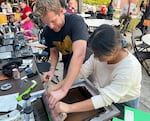
Pacific University students learn how to screen print shirts at a Pacific Votes voter engagement event on Oct. 11, 2024.
Tiffany Camhi / OPB
On a recent Friday night at Pacific University’s campus in Forest Grove, Oregon, students screen-printed designs emblazoned with the words “La Raza Unida” onto cream-colored T-shirts. They used spray paint and stencils to create graffiti art and others tried their hand at deejaying.
The event attracted dozens of students. But a voter registration booth, set up in the same space, sat mostly empty that night. The reason? Nearly all the students who attended the event were already registered voters.
“I’ve been registered to vote for a while but I thought it would be fun to come,” said Pacific sophomore Bradie Hanavan-Unger. The 19-year-old plans to vote for the first time next month.
Related: What you need to know about voting in Oregon and Southwest Washington
Turnout among young voters — typically measured between the ages of 18-29 — has historically been among the lowest of all age demographics. But the youth vote has shown signs of growth in recent elections, especially at college campuses like Pacific University. Students here vote at higher rates than both their peers and the general public nationwide. And in a divisive election year, some Pacific students are learning their vote can make a big impact.
Pacific University has been working to boost voter turnout among its students for decades. In fact, civic engagement is a part of the university’s core curriculum.
“The younger someone cast their first vote, the more likely they are to be a consistent and long term voter,” said Morgan Knapp, a program manager at Pacific’s McCall Center for Civic Engagement. “The more that we can reach out to young people and welcome them into this real privilege of being engaged in elections, the more likely they are to be committed citizens to this grand experiment of democracy.”
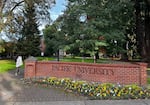
The Pacific University campus in Forest Grove, Ore., on Oct. 11, 2024. Civic engagement is a core requirement at the private liberal arts school.
Tiffany Camhi / OPB
Knapp says many students face what she calls “micro barriers” to voting: Some are confused about whether they should vote in Oregon or their home state. Others worry they don’t know enough about candidates and ballot measures to make informed decisions. And sometimes it’s as simple as not having a stamp on hand to send in registration forms.
Knapp’s office works to break down those barriers through a program called Pacific Votes. The nonpartisan program prepares students for elections through registration events and information sessions meant to demystify the voting process and discuss the importance of participating in civic life.
The work is paying off.
In the 2020 presidential election, more than 80% of Pacific students were registered to vote and nearly 68% of them cast a ballot, according to a campus report compiled by The National Study of Learning, Voting and Engagement at Tufts University. That’s one percentage point higher than the national average for voters of all ages that same year, according to census data. The Pacific rate is also far above their peers across the country: just 51% of people in the 18-24 age group voted in 2020. Though that number is a more than 10-percentage-point increase from prior general election years.
Related: Issues important to Oregon voters
This year the university is hoping to see a record number of Pacific students vote in the November presidential election.
Both the Republican and Democratic presidential campaigns are looking to harness the youth vote in this election. Vice President Kamala Harris’ campaign launched an effort to attract college-going voters in August, including a tour of campuses in key battleground states. Former President Donald Trump’s campaign has been engaging young voters through social media and podcasts.
The untapped demographic
Gigi Whisler, a sophomore studying education at Pacific, is ecstatic to vote for the first time next month.
“I’m a union member and a future educator so I like to say that I’m voting for the future of my profession and all of my future students,” said Whisler, who is already a member of the Oregon Education Association — the statewide teachers union — and active with the youth voter advocacy group Next Up. “I love to encourage other people to vote.”
Whisler has been drumming up voter turnout support among her peers by telling them they have a chance to be a part of history this year.
“We do have an opportunity to have the highest youth voter turnout for a presidential election ever, which I think is really amazing,” said Whisler.
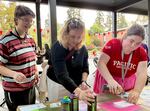
Pacific University students create stencil art with spray paint at a Pacific Votes event on Oct. 11, 2024. Sophomore GiGi Whisler, right, will vote for the first time this year.
Tiffany Camhi / OPB
Nearly 41 million Generation Z voters are eligible to vote this election year and more than eight million people in that group — aged 18-19 — would be voting for the first time ever, according to an analysis by the Center for Information and Research on Civic Learning and Engagement, a nonpartisan youth voter research group also based at Tufts University.
Related: Listen to 'OPB Politics Now'
Sophomore Kai Markle is a student ambassador for the Pacific Votes program. He believes young people have the power to change the face of the election. Still, Markle comes across peers who are not interested in voting. A big reason for that apathy is that many young people think their vote can’t or won’t influence an election.
“I like to focus on school board elections and local elections because these elections are won and lost by hundreds or thousands of votes, so individual input matters a lot,” said Markle. Sometimes Oregon has local races that are even closer than that — such as elections in 2022 and 2024 that resulted in ties.
Markle also hears from students who are upset with the status quo and decisions made by older generations. “But the reality of it is our age group does not vote in super-high numbers,” said Markle. “So if you want to make change, start voting, and encourage your peers to vote.”
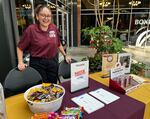
Staff from Centro Cultural, a community partner with Pacific University, wait to help students register to vote at a Pacific Votes event on Oct. 11, 2024.
Tiffany Camhi / OPB
Young adults in Oregon intent on voting this year
Across the state, many other young people — college-going and otherwise — say they also plan to cast votes this year.
A recent poll commissioned by OPB showed that nearly 80% of young adult respondents said they were certain to or probably would fill out their ballots — though turnout among this age group in past presidential elections suggests actual turnout will be closer to 70%.
The poll of 600 people between the ages of 18 and 40 was conducted by DHM Research from Aug. 6-12. Respondents were selected randomly and with an effort to ensure the survey was representative of Oregon’s demographics and geographic regions.
The top issues for young voters also echo older generations; housing affordability, addiction and mental health, costs of living and crime rounded out the top five problems younger Oregonians are most worried about.
Claire Yurovchak, 23, a student at Oregon State University in Corvallis who described herself as a liberal, said she would probably “grumble and complain” and ultimately vote for Kamala Harris for president.
“I don’t feel sufficiently represented by a major political party on a number of issues,” she said. On the issue of foreign policy, she said she’s upset by what she sees as a genocide unfolding in Gaza. “The U.S. needs to be limiting the shipment of weapons into Israel that are being used to kill civilians.”
Complexity and controversy not reasons to avoid voting
Pacific University student Caitlyn Sato recognizes that many young people have concerns about both candidates for president this election year.
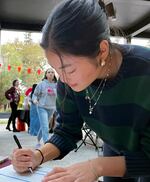
Pacific University student Caitlyn Sato fills out a voter registration form at a Pacific Votes event on Oct. 11, 2024.
Tiffany Camhi / OPB
“But even if you still struggle with both, it’s still important to make a decision because we just need people to vote to make a difference,” said Sato. “Staying neutral and not wanting to vote at all, I don’t think that helps.”
Sato transferred her voter registration from Hawaii to Oregon at the Pacific Votes event. She said she was relieved to have help on campus after trying to fix her registration online on her own, a process she said was confusing.
“I kept trying to figure it out and searching online, but I’m just glad that [the event] was here because I was stressing about it,” said Sato.
Now Sato said she can play her role as an engaged citizen in the general election and vote for a presidential candidate she thinks will improve the country.
OPB reporter Lauren Dake contributed to this story.
